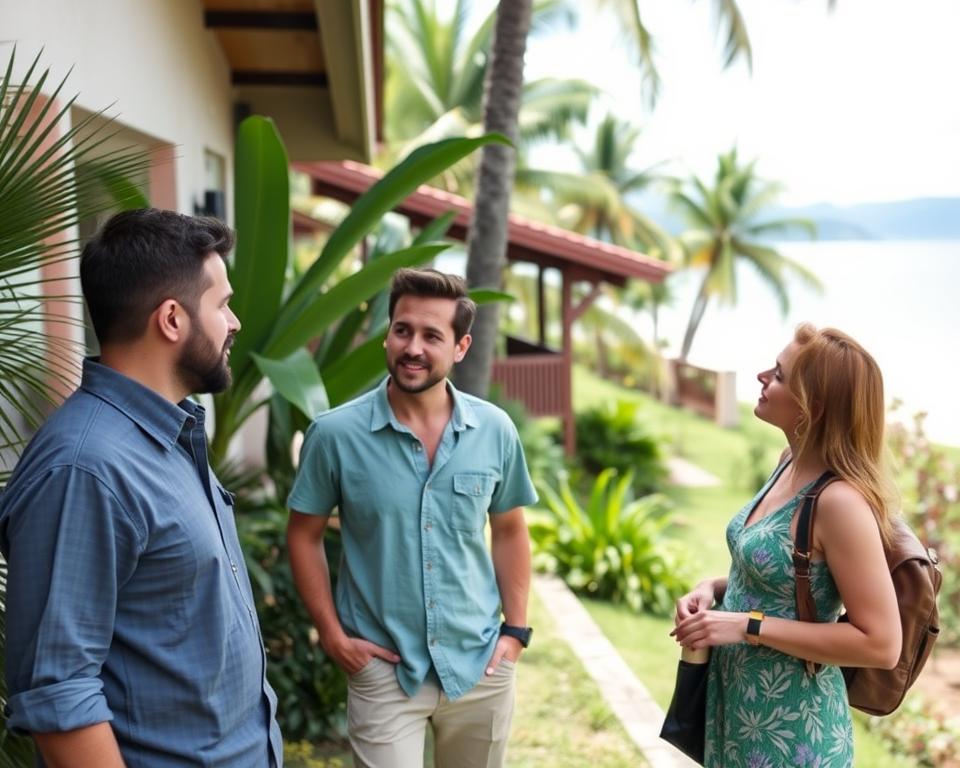Costa Rica Residency with a Criminal Record: Is It Possible?
Can you start fresh in Costa Rica with a criminal record? Many expats wonder about this as they dream of its beauty and lifestyle. It’s important to understand Costa Rica’s immigration rules for those with a criminal history. This article will look into how a criminal record affects getting residency in Costa Rica.
It shows that while there are hurdles, it’s still possible to get residency. This makes Costa Rica a tempting place for a new start.
Key Takeaways
- Costa Rica offers several residency options, including temporary permits lasting up to 2 years.
- People with a criminal record may face challenges but aren’t always barred.
- The residency process usually takes 9 to 12 months.
- Some criminal offenses can permanently stop you from getting residency.
- Getting citizenship in Costa Rica requires different residency times based on your nationality.
The Basics of Costa Rica Residency
Residency in Costa Rica offers different paths for those wanting to move here. You can choose from temporary or permanent residency. There are special visas like pensionado, rentista, and investor visas for various needs and financial situations.
To apply for a pensionado visa, you need to show at least $1,000 monthly from a pension fund. For a rentista visa, you must prove $2,500 monthly for five years. You also need a bank guarantee and a $150,000 certificate of deposit. An investor visa requires a $200,000 investment, helping the local economy.
Living in Costa Rica as an expat has many benefits. You can work legally and travel easily in Central America. Costa Rica is close to Miami and known for being happy and green. It’s also ranked high in human development and environmental performance, attracting those seeking a good balance in life and community.
Understanding Costa Rica Immigration Laws
Costa Rica’s immigration laws are detailed for those wanting to live there. They look at many things, like your past, under certain rules. Knowing these rules is key to applying for residency.
Getting legal residency in Costa Rica means a deep check of your past. Authorities look closely at your criminal history. If you have a criminal record, getting approved might be harder, by up to 50%.
To apply for residency, you need to give important documents. A police clearance certificate is one of them. It shows your background and if you’re eligible for residency.

The time it takes to process temporary residency is about six months to a year. Knowing the immigration laws well is important. They tell you if you can live there and what happens if you can’t.
With the right knowledge, you can prepare well for your residency application. This includes knowing the financial needs for residency. You can find out about visa categories and their benefits.
In short, knowing Costa Rica’s immigration laws, and how they handle past crimes, is crucial. It helps make your residency application smoother.
Can You Get Residency in Costa Rica with a Criminal Record
Getting Costa Rica residency with a criminal record is tough. People thinking of moving there should know how their past affects their chances. It’s key to understand the rules about criminal records for residency.
Overview of Criminal Record Impacts
A criminal record can really hurt your chances in Costa Rica. The country’s immigration looks closely at who they let in. They want people who are safe and honest.
Applicants need to show their criminal history. This includes background checks. If you don’t tell the truth, you might not get in or could face problems.
Types of Felonies that Disqualify Residency Applications
Some crimes make it hard to get residency in Costa Rica. Here are the main ones:
- Drug trafficking and related offenses
- Violent crimes, including assault or homicide
- Fraud or financial crimes
- Sexual offenses
Knowing these crimes can help you figure out your options. Even if some cases can be appealed, it’s smart to talk to immigration experts. They can help you find ways to move forward.
Residency Requirements in Costa Rica
Getting residency in Costa Rica means you have to meet certain rules and provide the right documents. It’s important to get your paperwork right, like the background check. This helps make sure your application goes smoothly.
General Documentation Needed for Residency
Here are the main documents you need for residency in Costa Rica:
- Valid passport with at least six months of validity remaining.
- Birth certificate, issued within the last six months.
- Proof of financial means, showing you can support yourself.
- A clean criminal record from your home country and any other country you’ve lived in for the last three years.
- Two passport-sized photographs.
You must give a full set of documents, including your criminal record. This is a must for everyone, no matter your age. It can take 18 to 24 months to process these, so start early.
Background Check and Clean Criminal Record Certification
A detailed background check is key for residency in Costa Rica. You need to show you have no criminal record. If you do, it could lower your chances of approval by up to 50%.
For more info and details on residency options, check out this resource. Being clear and thorough in your application is crucial for a smooth process.

Legal Pathways for Residency Despite Criminal History
People with a criminal record can find legal ways to get residency in Costa Rica. The country has rules to help applicants with past crimes. Knowing about expungement and special cases can help a lot.
Exploring Options for Expungement
Expungement in Costa Rica can erase criminal records under certain rules. This can help meet residency needs. To qualify, applicants must meet specific criteria and show their situation has improved.
This option helps those with criminal records look better for residency.
Possible Exemptions Based on Criminal History
There are special rules for people with criminal records in Costa Rica. Immigration officials look at how long ago the crime was and if the person has changed. In some cases, people can still get residency, even with a criminal record.
It’s important to know these rules for those trying to get residency in Costa Rica.
Steps to Apply for Residency in Costa Rica
Applying for residency in Costa Rica needs careful planning. Knowing the steps can make it easier. It’s important to gather all needed documents and follow the rules.
Gathering Required Documents
The first step is to collect the documents needed for residency. These show you meet the local laws. For those over 18, you must have a clean criminal record. You’ll need:
- Proof of income, like pay stubs or bank statements
- Legal documents needing apostilles for verification
- Completed application forms
- Two passport-sized photos
- Police criminal record check from your home country
- Health certificate showing you’re physically well
Getting these documents takes time. You’ll need to work with different agencies. Having a plan for gathering documents helps avoid delays.
Submitting the Residency Application Process
After you have all your documents, you can start the application process. It’s key to make sure everything is correct. Here’s what to do:
- Go to the Costa Rican consulate or embassy in your country to submit your application.
- Be ready for interviews and more questions.
- Remember, it can take up to a year, so be patient.
- Keep checking on your application for updates.

By following these steps and meeting all requirements, you can make your application smoother. This way, you can start your new life in Costa Rica with confidence.
Implications of a Criminal Record on Residency Approval
Understanding the impact of a criminal record on getting residency in Costa Rica is key. Immigration officials have strict rules to follow. Those with a criminal record face big challenges in getting approved.
The type and severity of the crime can affect your chances. Some felonies mean you can’t get residency. Violent crimes or serious drug offenses usually lead to denial.
It’s also important to know about the timeline and needed documents. Immigration looks closely at your background. You must have all your documents ready and translated.
Having a detailed application is crucial. Each type of residency, like Rentista or Pensionado, has its own rules. You might need to show you have a steady income. If you have a criminal record, getting help from experts like CRIE can be very helpful.
Conclusion
Getting residency in Costa Rica with a criminal record is complex. The legal hurdles can be tough, mainly because of the need for a clean record. Felons might face extra checks, and some crimes could block their application.
Applicants should know their options well. Getting help from a lawyer can make a big difference. They can guide you through the legal maze, including expungement or special cases.
Even with a criminal history, you can still get residency. Success stories prove it’s possible with the right steps. Knowing the rules well is key to getting approved.
Immigration laws change often. Keeping up with these changes is crucial. This way, you can meet all the requirements and get your residency in Costa Rica.




